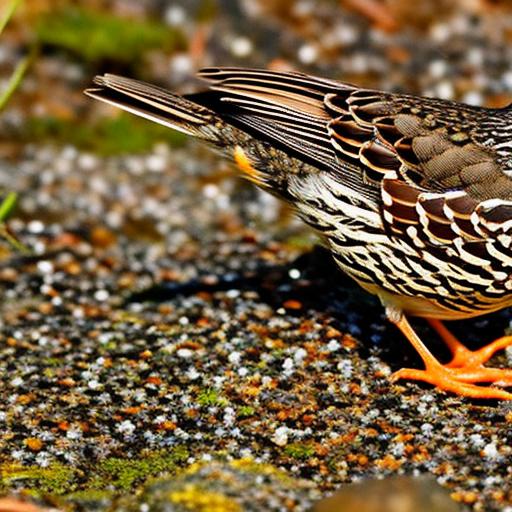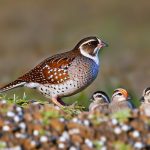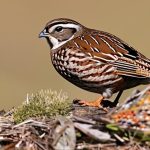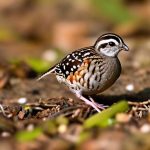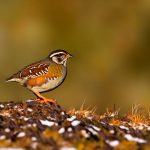Quail keeping has become increasingly popular in Maine due to the small size of these birds, their low maintenance requirements, and the delicious eggs they produce. Quail are also known for their gentle nature and beautiful plumage, making them a delightful addition to any backyard or homestead. In Maine, quail keeping is not only a hobby but also a sustainable way to produce fresh eggs for personal consumption or even for sale. Whether you are a beginner or an experienced poultry keeper, raising quail in Maine can be a rewarding and enjoyable experience.
Quail keeping in Maine offers a unique opportunity to connect with nature and experience the joy of caring for these charming birds. With the right knowledge and resources, anyone can successfully raise quail in Maine, regardless of their level of experience. From choosing the right quail species for Maine’s climate to providing proper housing and nutrition, there are several key factors to consider when embarking on a quail keeping venture in Maine. This comprehensive guide will provide valuable insights into the various aspects of quail keeping in Maine, including species selection, housing requirements, feeding and nutrition, health management, breeding and reproduction, as well as legal considerations. By understanding these essential elements, you can ensure the well-being and productivity of your quail flock while complying with local regulations and guidelines.
Key Takeaways
- Quail keeping in Maine is a rewarding hobby that requires proper knowledge and preparation.
- When choosing the right quail species for Maine’s climate, consider cold-hardy breeds such as the Coturnix quail.
- Housing and enclosure requirements for quail in Maine include providing adequate space, protection from predators, and proper ventilation.
- Feeding and nutrition for quail in Maine should include a balanced diet of commercial quail feed, supplemented with greens and protein sources.
- Health and disease management for quail in Maine involves regular observation, proper sanitation, and prompt treatment of any signs of illness.
Choosing the Right Quail Species for Maine’s Climate
When it comes to choosing the right quail species for Maine’s climate, it is essential to consider the specific environmental conditions and temperature fluctuations that the birds will be exposed to throughout the year. In Maine, the climate can vary significantly, with cold winters and mild summers being characteristic of the region. Therefore, it is crucial to select quail species that are well-suited to these conditions and can thrive in the local climate.
One of the most popular quail species for Maine is the Coturnix quail, also known as Japanese quail. Coturnix quail are highly adaptable and can tolerate a wide range of temperatures, making them well-suited for Maine’s climate. These quail are also known for their prolific egg-laying capabilities, making them an excellent choice for those interested in egg production. Another suitable quail species for Maine is the Bobwhite quail, which is native to North America and can withstand colder temperatures. Bobwhite quail are known for their distinctive call and are often sought after for their meat as well as their eggs. By selecting quail species that are resilient and adaptable to Maine’s climate, you can ensure the long-term success of your quail keeping venture.
In addition to considering the climate, it is important to choose quail species that align with your specific goals and preferences. Whether you are interested in egg production, meat, or simply enjoying the beauty of these birds, there are various quail species to choose from, each with its own unique characteristics and attributes. By carefully evaluating your needs and the requirements of different quail species, you can make an informed decision that will ultimately contribute to the success of your quail keeping endeavor in Maine.
Housing and Enclosure Requirements for Quail in Maine
Providing proper housing and enclosure for quail in Maine is essential for ensuring their safety, well-being, and productivity. When it comes to housing quail, there are several key factors to consider, including space requirements, shelter, protection from predators, and environmental enrichment. In Maine, where the climate can be harsh at times, it is crucial to provide adequate shelter and protection for quail to thrive throughout the year.
Quail housing should be designed to accommodate the specific needs of the birds while also allowing for ease of maintenance and cleaning. The size of the enclosure will depend on the number of quail being kept, but as a general rule of thumb, each bird should have at least 1-2 square feet of space to move around comfortably. The enclosure should also include a sheltered area where quail can seek refuge from inclement weather and extreme temperatures. Additionally, providing environmental enrichment such as perches, dust baths, and hiding spots can contribute to the overall well-being and behavioral health of the quail.
In terms of protection from predators, it is important to secure the enclosure with sturdy fencing or wire mesh to prevent access from predators such as raccoons, foxes, and birds of prey. The bottom of the enclosure should also be reinforced with wire mesh or buried underground to deter burrowing predators. By implementing these measures, you can create a safe and secure environment for your quail flock to thrive in Maine’s diverse landscape.
Feeding and Nutrition for Quail in Maine
Feeding and nutrition play a crucial role in the health and productivity of quail in Maine. Providing a balanced diet that meets the nutritional requirements of these birds is essential for supporting their growth, egg production, and overall well-being. When it comes to feeding quail in Maine, there are several key considerations to keep in mind, including the type of feed, feeding schedule, and access to clean water.
Quail require a high-protein diet to support their rapid growth and egg-laying capabilities. A commercial game bird feed that contains around 24-28% protein is an ideal option for quail in Maine. This type of feed is specifically formulated to meet the nutritional needs of game birds and can provide essential vitamins and minerals necessary for optimal health and performance. In addition to commercial feed, quail can also benefit from supplemental treats such as mealworms, fruits, vegetables, and greens, which can contribute to a varied and balanced diet.
Feeding quail on a consistent schedule is important for maintaining their health and productivity. Providing access to feed throughout the day will ensure that quail have constant access to nutrients without overeating or becoming malnourished. It is also essential to provide clean water at all times, as quail can quickly become dehydrated, especially during hot weather or when laying eggs.
By paying close attention to the feeding and nutritional needs of quail in Maine, you can support their overall health and performance while contributing to the success of your quail keeping venture.
Health and Disease Management for Quail in Maine
Maintaining the health and well-being of quail in Maine is essential for ensuring their longevity and productivity. Like all poultry species, quail are susceptible to various health issues and diseases that can impact their overall welfare. Therefore, implementing proactive measures for disease prevention and management is crucial for maintaining a healthy quail flock in Maine.
One of the most important aspects of health management for quail is maintaining a clean and sanitary environment within their housing and enclosure. Regular cleaning of the living space, including removing droppings, replacing bedding, and disinfecting feeders and waterers, can help prevent the spread of pathogens and reduce the risk of disease transmission. Additionally, providing proper ventilation and adequate space within the enclosure can contribute to overall health by minimizing stress and preventing respiratory issues.
Another key aspect of disease management for quail in Maine is monitoring their behavior and appearance for any signs of illness or distress. Common indicators of poor health in quail include lethargy, decreased appetite, abnormal droppings, respiratory symptoms, or changes in feather condition. By closely observing your quail flock on a regular basis, you can quickly identify any potential health concerns and take appropriate action to address them.
In addition to proactive measures for disease prevention, it is important to have a working relationship with a veterinarian who specializes in poultry health. A knowledgeable veterinarian can provide valuable guidance on disease management strategies, as well as diagnostic testing and treatment options if health issues arise within your quail flock.
By prioritizing health management and disease prevention for your quail in Maine, you can create a thriving environment where these birds can flourish while minimizing the risk of potential health challenges.
Breeding and Reproduction of Quail in Maine

Breeding and reproduction are integral aspects of quail keeping in Maine for those interested in expanding their flock or producing offspring for various purposes. Whether you are interested in hatching your own chicks or maintaining a sustainable breeding program, understanding the fundamentals of quail reproduction is essential for achieving successful outcomes.
In Maine, quail breeding typically occurs during the spring and summer months when environmental conditions are conducive to reproduction. To encourage successful breeding, it is important to provide an appropriate environment that mimics natural conditions while also ensuring that both male and female quail are healthy and well-nourished. Creating a comfortable nesting area within the enclosure can encourage broody behavior in female quail while providing privacy for mating activities.
Once breeding has occurred, it is important to monitor the nesting area closely for signs of egg-laying and incubation. Quail eggs typically have an incubation period of approximately 17-18 days before hatching. During this time, it is essential to provide consistent warmth and humidity within the incubation environment to support embryo development.
After hatching, it is important to provide proper care and nutrition for the young chicks to ensure their healthy growth and development. This includes providing access to a high-protein starter feed, clean water, warmth, and protection from potential predators within a separate brooding area.
By understanding the fundamentals of breeding and reproduction for quail in Maine, you can successfully expand your flock while contributing to the sustainability of your quail keeping venture.
Legal Considerations for Keeping Quail in Maine
When it comes to keeping quail in Maine, there are several legal considerations that must be taken into account to ensure compliance with local regulations and guidelines. Understanding the legal requirements for keeping quail is essential for avoiding potential fines or penalties while also promoting responsible stewardship of these birds within the community.
In Maine, individuals who wish to keep quail may be subject to specific regulations regarding zoning restrictions, permits, or licensing requirements depending on their location within the state. It is important to research local ordinances and consult with relevant authorities such as municipal offices or agricultural agencies to determine any specific requirements that may apply to keeping quail on your property.
Additionally, it is important to be aware of any restrictions related to selling or distributing quail eggs or meat products within Maine. Depending on local regulations, individuals may need to obtain specific permits or certifications related to food production or sales if they intend to market quail products commercially.
Furthermore, it is important to stay informed about any potential disease outbreaks or biosecurity measures that may impact poultry keeping within Maine. Staying up-to-date with relevant information from state agricultural agencies or veterinary authorities can help mitigate potential risks while promoting responsible practices for disease prevention and management within the poultry community.
By understanding and adhering to legal considerations for keeping quail in Maine, individuals can ensure that their activities align with local regulations while contributing positively to the welfare of these birds within their community.
In conclusion, raising quails in Maine offers a unique opportunity for individuals to connect with nature while enjoying the benefits of fresh eggs production or meat supply. By carefully considering factors such as species selection based on climate suitability; providing proper housing; ensuring adequate nutrition; managing health; understanding breeding; as well as adhering to legal considerations; individuals can successfully raise healthy quails while complying with local regulations. With proper knowledge and dedication; raising quails in Maine can be an enjoyable experience that contributes positively towards sustainable poultry keeping practices within the community.
If you’re interested in raising quail in Maine, you might also want to check out Poultry Wizard’s article on “Can Geese Eat Chicken Feed?” This informative piece discusses the dietary needs of geese and how chicken feed can be a suitable option for them. It’s always helpful to expand your knowledge of poultry care, and understanding the feeding habits of different birds can be beneficial when managing a diverse flock. Learn more here.
FAQs
What are the regulations for keeping quail in Maine?
In Maine, individuals must obtain a permit from the Maine Department of Inland Fisheries and Wildlife to keep quail. The permit outlines specific requirements for housing, care, and management of quail.
What are the housing requirements for quail in Maine?
Quail in Maine must be housed in a secure enclosure that provides protection from predators and the elements. The enclosure should also allow for adequate space for the quail to move around and exhibit natural behaviors.
What do quail eat in Maine?
Quail in Maine can be fed a diet consisting of commercial quail feed, supplemented with fresh greens, insects, and grit. It is important to provide a balanced diet to ensure the health and well-being of the quail.
What are the common predators of quail in Maine?
Common predators of quail in Maine include foxes, raccoons, hawks, and owls. It is important to take measures to protect quail from these predators, such as using secure enclosures and providing adequate shelter.
What are the potential health issues for quail in Maine?
Quail in Maine may be susceptible to health issues such as respiratory infections, parasites, and nutritional deficiencies. It is important to monitor the health of the quail and seek veterinary care if any issues arise.
Can quail be kept for commercial purposes in Maine?
In Maine, individuals can keep quail for commercial purposes, such as egg production or meat production. However, specific regulations and permits may be required for commercial quail operations.
Meet Walter, the feathered-friend fanatic of Florida! Nestled in the sunshine state, Walter struts through life with his feathered companions, clucking his way to happiness. With a coop that’s fancier than a five-star hotel, he’s the Don Juan of the chicken world. When he’s not teaching his hens to do the cha-cha, you’ll find him in a heated debate with his prized rooster, Sir Clucks-a-Lot. Walter’s poultry passion is no yolk; he’s the sunny-side-up guy you never knew you needed in your flock of friends!

